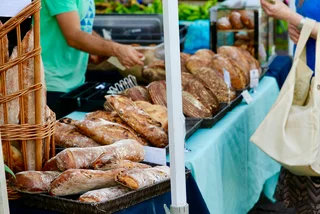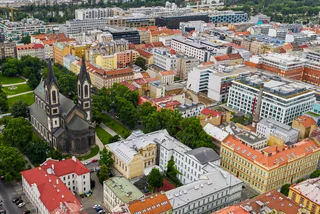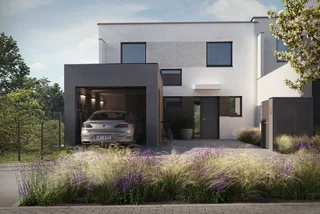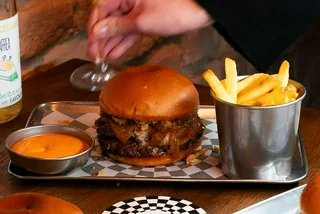Two new international trends are making their way into Prague: dark stores and cloud kitchens. These are both types of retail establishments aimed at delivery and not walk-in sales traffic, and both have a big impact on the real estate market.
Both of these types of businesses advertise on the internet or social media, offering their products for quick delivery. They often have very competitive prices due to lower overhead. These types of stores do not need to be visible to passers-by to attract customers, they just need good transport connections for delivery couriers as well as restocking, which usually takes place daily.
Dark stores function as smaller, in-between stores for online retailers and are designed for quick delivery of goods in the nearby area. The operators can guarantee delivery of goods in a particular neighborhood within 15 minutes of ordering, giving them a major competitive advantage.
Marjan Gigov of real estate consultancy Colliers said the dark store trend could gradually change the face of cities or certain areas. "There are more and more of these operators, and they are usually trying to build a dense network of branches. Therefore, we can expect that the real estate market will see a growing interest in this type of space usage: not only in Prague but also in other major Czech cities," Gigov said.
Restaurants without seats
The related trend of cloud kitchens, also called virtual or ghost kitchens, became popular during the pandemic, when interest in food delivery saw a boom. The use of food delivery services has continued to grow in Czechia.
Cloud kitchens are prep rooms for online-ordered meals that are then delivered to customers via a third-party delivery service – a third-party delivery platform such as Uber Eats, Wolt, Bolt, or Foodora. Like dark stores, they do not seek to attract walk-in customers. The kitchens do not have seating for customers to eat at the premises.
The kitchens can also be used by catering companies to prepare their orders. "In addition to ordinary customers, restaurants or hotels are also starting to use cloud kitchen services, which help them get the most from their expensive premises in busy, attractive locations for their guests," Gigov said.
Cloud kitchens usually make do with spaces ranging from 300 to 500 square meters. Gigov said that the first Cloud Kitchen in Prague is MyFoodPlace, which is already used by a number of established restaurants to prepare meals for delivery or catering events. "The cloud kitchen concept has a future, so we expect it to expand throughout Prague," Gigov adds.
MyFoodPlace has a limited delivery area in the southern part of Prague, and like many cloud kitchens offers a wide variety of cuisines ranging from Indian food to Czech classics. Aside from its own menu, MyFoodPlace lists nine restaurants that it can deliver food for.
Since dark stores and cloud kitchens do not serve customers directly, they can be located in more remote parts of the city and can fill unattractive real estate that has long gone unused on side streets or in industrial areas.
"While the ideal location for dark stores is in the middle of a densely populated area, the premises can be located in more remote streets, often in inner-city areas. This usually involves the cheapest parts of the area," Gigov said.
"In Prague, rental rates for this type of space are currently below EUR 10 per square meter per month, which is on average 60 percent less than in better locations," he added.
Not everyone is a fan
In some countries, there is already pushback against these business models. Critics of dark stores say that even though the outlets resemble traditional retail stores, they do not physically sell goods at all.
This affects the traditional look of cities and the structure of lifestyles, and also threatens to drive brick-and-mortar stores out of business. Residents in the vicinity may in turn be bothered by increased traffic congestion and the associated noise and air pollution from the couriers and deliveries.
For cloud kitchens, one issue seen worldwide is the variable quality of food. While a customer in some cases thinks they are getting a meal made at a well-known restaurant, they instead get one made from similar ingredients prepared by cooks who might not be up to the same caliber as those at the actual restaurant.
Another criticism in places where cloud kitchens have become popular is that the facilities are often not subjected to the same regulations and inspections that traditional restaurants face.
Efforts to limit or ban them
Some cities have attempted to restrict or even ban dark stores unless they offer actual sales with access for passing customers. Paris, for example, defines dark stores not as shops but as warehouses or industrial properties, which allows them to be zoned separately. Amsterdam is trying to restrict the creation of new dark stores and Barcelona has even pushed for a complete ban on them.
"In the Czech Republic, these establishments tend to be built around office parks, where they do not burden residents as much. That is why the concept is not criticized in our country as it is in the other aforementioned European cities, where very small establishments often operate in the middle of residential districts," Gigov said.












 Reading time: 4 minutes
Reading time: 4 minutes 


























